How did smaller parties do in London Assembly elections?
- Published
Ken v Boris grabbed the headlines but a host of lesser known parties and independents stood on the same day to get elected to the London Assembly. How did they get on?:
Christian Peoples Alliance
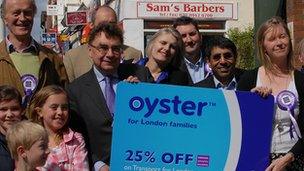
The CPA went into the election as the strongest party without representation on the London Assembly
Having put in a decent showing in 2008 when mayoral candidate Alan Craig finished in sixth place, the Christian party could not find a suitable candidate to stand for mayor this time around. As a result they failed to raise their profile and struggled to get the media coverage they achieved four years ago, a spokesman said.
Finishing seventh with 1.7% of the Assembly vote, the party's spokesman said their focus on potential changes to the legal definition of marriage, instead of issues like housing or fares, did not find an audience with the London electorate.
"We looked out of touch but it was the right thing to do," he added.
English Democrats
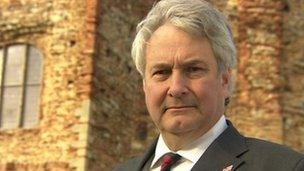
Robin Tilbrook said his party needed more resources
Chairman Robin Tilbrook said he was "quite pleased" with his party's performance.
At exactly 1% of the London-wide vote, the campaigners for an English parliament were 0.1% down on four years ago. But Mr Tilbrook said the party's campaign was minimal and the results proved they could reach 1% "without any effort".
"We only spent £1,000 on campaigning so our costs per vote were vastly less than UKIP's," he said.
Trade Union Socialist Coalition
Formed in 2010 and standing for the first time in the London Assembly elections, the coalition of socialists and trade union activists received 17,686 London-wide votes.
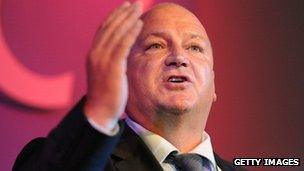
RMT union leader Bob Crow is a senior member of the coalition
Spokesperson Paula Mitchell said the group's campaign for an alternative to austerity was well received in workplaces around London but the lack of press coverage made it impossible to reach a wider audience in a city of millions.
"Labour doesn't do it for working people anymore. We're not going anywhere," she added.
Ijaz Hayat
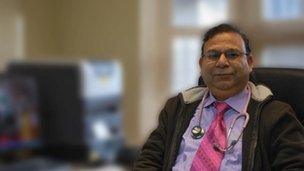
Dr Hayat's patients shared their housing and unemployment problems with him
Walthamstow GP Dr Hayat stood in North East London and on the London-wide list because, he said, "none of the other candidates were strong enough to take the people's voice to the Assembly".
Dr Hayat told the BBC his first experience of elected politics was a disappointing one. He was expecting 25,000 London-wide votes, which would have put him in eighth place ahead of the English Democrats, but managed 9,114.
Residents' Association of London
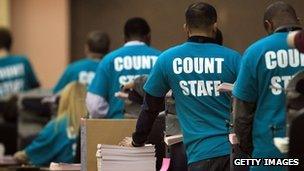
Former policeman and councillor Malvin Brown, the party's only candidate, finished ahead of the Lib Dems, Greens and BNP in the Havering and Redbridge constituency.
Mr Brown picked up 8,239 votes, or 6%, after opposing political correctness in the police, building on the green belt, and the closure of a local hospital.
The House Party

The House Party were formed by Terry McGrenera after he left the Greens
Former Green Party candidate and journalist Terry McGrenera registered the one-man House Party to improve housing in the capital.
He said he wanted to prevent London becoming a "city of the rich".
He got 8,126 votes on the London-wide party list.
National Front
The nationalist party, which wants to halt all non-white immigration, stood in three London Assembly consistencies, finishing last in all of them.
In Havering and Redbridge, the National Front candidate increased the party's share of the vote from 2008 but in the Greenwich and Lewisham and Ealing and Hillingdon constituencies support fell.
The party received just over 8,000 votes in the London-wide Assembly poll, finishing 12th.
Greenwich and Lewisham People Before Profit
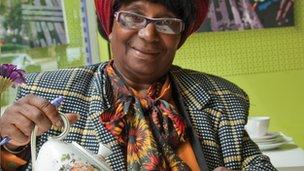
Mother of 10 Barbara Raymond stood in the Greenwich and Lewisham constituency, finishing fifth - ahead of UKIP - with 6,873 votes or 5.2%.
The local group has stood in council elections before but was fielding its first London Assembly candidate.
Campaign official John Hamilton said the party, which opposes "making ordinary people pay for the banking bailout", had achieved its highest ever vote and was "happy with the result".
Communities United Party
Kamran Malik stood against what his spokesperson called the "one party dictatorship" in Newham, east London where Labour achieved 63% of the vote.
He finished sixth in the City and East London Assembly constituency, with 6,774 votes. The east London lawyer said he was standing because "working class people are struggling".
Rathy Alagatnam
Ms Alagatnam, standing as an independent for the second time, finished bottom of the London-wide party poll, picking up 4,835 votes. She improved on her 2008 performance by 0.1%.
The Socialist Party
Keen to distance themselves from the Socialist Party of England and Wales, who make up one section of the Trade Union Socialist Coalition, the Socialist Party stood candidates in two Assembly consistuencies.
Both James Martin (Merton and Wandsworth) and Daniel Lambert (Lambeth and Southwark) finished last in their respective contests, gaining 4,281 votes between them.
Mr Martin said they campaigned for the "outright abolition of the wages system".
Thamilini Kulendran
Mr Kulendran finished sixth in the contest for Merton and Wandsworth with 2,424 votes.
Communist League
Not to be confused with the Communist Party, the Communist League stood one candidate - Paul Davies in the City and East London constituency. Meat factory worker Mr Davies stood for parliament for the Communist League in 2010.
He finished in last place in last week's City and East London Assembly elections with 1,108 votes.
- Published29 March 2012